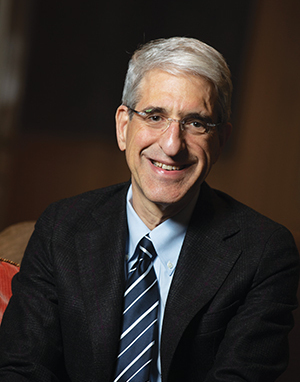
Mark Ostow
The Yale Alumni Magazine publishes a letter in every issue from President Peter Salovey ’86PhD. In this issue, he writes on the importance of the humanities.
View full image
Dear Friends,
We are embarking on a new year—a time when many of us set goals and think about what we would like to accomplish in the year ahead. This can be a season of reflection as well, as we pause to consider how we spend our time, what we value, and what truly matters.
What matters? People over the centuries have wrestled with this fundamental question. Literature, art, music, architecture, languages, and religions reflect people’s attempts to make sense of the world and their place in it. Indeed, the humanities, as a set of scholarly disciplines, reflect the staggering complexity and beauty of the human experience.
The humanities are not merely a record of past achievements; they speak to contemporary concerns as well. Over the past year, faced with a global pandemic, protests over racial injustice, and changes to the daily rhythms of our lives, we have relied on the expertise of scholars, researchers, and practitioners in fields such as public health, medicine, nursing, and the social sciences. At the same time, in the midst of so much uncertainty and confusion, many of us have looked to the humanities for comfort, insight, and, most of all, understanding.
Yale’s breadth and depth of expertise across disciplines means that many faculty members—in the humanities as well as the sciences and social sciences—have been working for years on issues relevant to understanding the COVID-19 crisis. Take, for example, Frank M. Snowden, the Andrew Downey Orrick Professor Emeritus of History and History of Medicine at Yale. His recent book, Epidemics and Society: From the Black Death to the Present, published just months before the appearance of the novel coronavirus, examines major epidemics and how they have reshaped society over the past two thousand years. This project is the result of Professor Snowden’s years of teaching Yale undergraduates, helping them understand the social and political implications of SARS, Ebola, and other public health crises.
As part of Yale’s exemplary tradition of humanities teaching and scholarship, Professor Snowden’s work is deeply researched and broadly accessible. It speaks to our contemporary concerns—loudly!—but it also explores fundamental questions about culture, politics, and psychology. Professor Snowden, interviewed last spring in the New Yorker, said that epidemics “hold up the mirror to human beings as to who we really are. That is to say, they obviously have everything to do with our relationship to our mortality, to death, to our lives.” These topics are among the facets of our existence that the humanities have long helped us explore.
Humanities scholars at Yale today, like previous generations of faculty well known to alumni, are engaging with issues of responsibility—to one another, to our planet, and to the greater good. Kathryn Lofton, the Lex Hixon Professor of Religious Studies, American Studies, and History, and the Faculty of Arts and Sciences dean of humanities, has noted that Yale faculty members are committed to helping people navigate critical challenges. “In pandemic, war, and social upheaval,” Professor Lofton said, “individual accomplishment and glory take a backseat to being present to what is going on around us, asking how we can best serve others in this particular moment.”
Today, we are strengthening Yale’s historic commitment to the humanities. The Humanities Quadrangle at 320 York Street—the former Hall of Graduate Studies—was completed in December, bringing together humanities scholarship and teaching under one roof. This tremendous space, carefully designed to encourage collaboration among scholars from different departments, will further support Yale students and faculty as they search for “light and truth” in the complexity of the human experience.
The humanities are not just something we study and then neglect after graduation. The questions they raise, and the ways they teach us to examine and make sense of the world, stay with us for a lifetime. Perhaps this is their most enduring value—for us as individuals, as a university, and as a society. This is why the humanities are an integral part of the liberal education that Yale has long championed. As former Yale president Kingman Brewster ’41 once said, “Perhaps the most fundamental value of a liberal education is that it makes life more interesting. . . . It makes it less likely that you will be bored with life.”
With history as our guide, we know our society will continue to face great challenges in the future. We need the humanities to help us make sense of both everyday events and momentous disruptions. I take comfort in knowing that Yale faculty, students, and alumni will continue to enliven these fields, asking the vital questions that make life more interesting and more meaningful.
With my warmest wishes,
Peter Salovey
President
Chris Argyris Professor of Psychology
 loading
loading